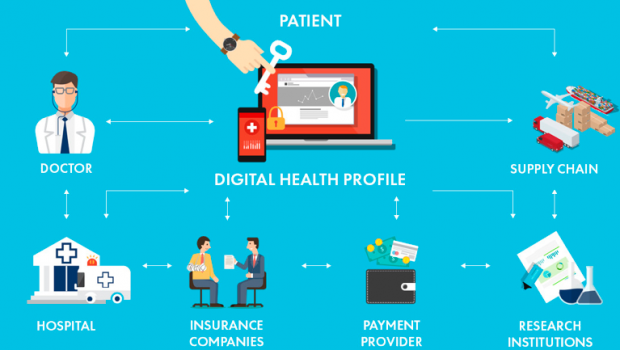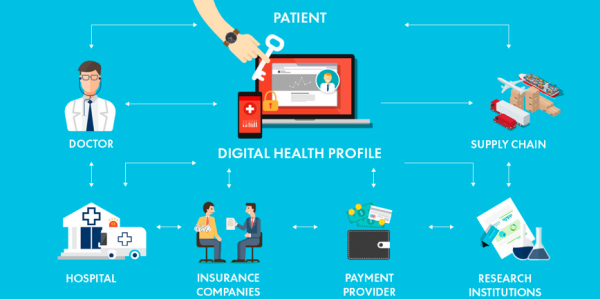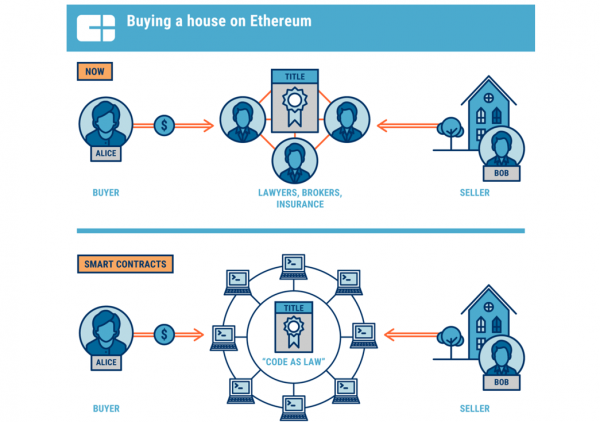3 Largest Industries Blockchain Will Change the Most
Blockchain technology is multi-faceted, and it finds its application across several sectors, and strata of business. Its usefulness in imbibing transparency, consumerism, and logistics has made it a valuable asset to have in any industry. It is not too long ago, that ‘experts’ touted blockchain technology to fail the test time presents, and succumb. Of the many proud exponents of blockchain technology, Bitcoin stands heads and shoulders above the rest. While Bitcoin isn’t experiencing the best of times, it is still the most valuable cryptocurrency in the world, and as of the 1st of December, 2019, it is valued at a stellar $7297.25.
Of the many industries blockchain technology is playing a part in, a few stand out for the sheer convenience the technology brings to their operation. The Healthcare, Banking, and Real Estate industries, are benefitting greatly from blockchain technology, and are set to experience a renaissance of sorts in the future, with due respect to the impact blockchain technology will bring to their proceedings, and way of being. Here are a few promising projects in these sectors, and the general change these strata of business will experience in the near future.
Healthcare
There was a time when cryptocurrencies like Bitcoin and Ethereum were lambasted for the number of transactions they could handle per second. To put it into perspective, payment processors like VISA and MasterCard can handle up to 8,000 transactions per second, compared to the measly 10 transactions per second that Bitcoin can provide for. Relictum Pro is a project, bound to bring about a revolution in the healthcare industry, and several other sectors of business. Relictum Pro, with its reliable electronic data circulation environment, can handle up to 1,000,000 transactions per second.
This is an astronomical number when compared to other payment processors, and a game changer to say the least. According to a recent study conducted by John Hopkins, medical error is the third leading cause of death in the United States alone. Taking into consideration the fact that most manuscripts produced in hospitals the world over are handwritten, and that in one’s lifetime, a person is more likely than not to have medical records strewn across multiple medical institutions, having a single distributed ledger processing all transactions for medical referencing, makes sense.
This minimizes the risk of medical error, and puts Relictum Pro to the fore. With its capacity to process one million transactions per second and fill nodes within a few seconds of initiation (1-2), the biggest hospital chains can make use of this technology to ensure minimal delays in medical data transfer and processing. Medical frauds cost the United States $100-170 billion every year. Distributed ledger technology eliminates the middle man, ensuring transparency of billing and payments between patients and healthcare institutions.
Institutions adopting the Relictum Pro architecture will transact in Relict Coin, a stable coin released by the organization. It is abject to external political and economic influences, with its underlying algorithm eradicating its influence to possible inflation. While the healthcare industry is bound to adopt Relictum Pro in the near future, other industries too, can jump on its bandwagon, and reap its benefits.
MedRec is another project that looks to give patients a transparent, and accessible view of medical history. It intends on storing patient information in one place, making it much simpler for patients to access information, and for doctors to have certified patient history reports, and information. In MedRec’s current design, providers will maintain the blockchain powered technology through the Proof of Authority (PoA) mechanism.
Banking
Major Banks all over the world are trying out blockchain technology, in the quest of using it for money transfers, record keeping, and other important back-end functions. Banks are keen on reducing transaction costs, and the amount of paperwork it takes to process information, and requests. Implementing blockchain technology will be a major step in increasing profits.
An electronic digitalized ledger eliminates paper-intensive international financial trade processing, and gives all participating entities, including banks access to a single source of information. Blockchain technology also helps Banks track and validate ownership of assets, and documents digitally, as a ledger that cannot be altered, all in real time.
Of the 26 publically listed Banks in China, 12 are already using blockchain technology, including the likes of the Bank of China, and China Merchants Bank. Banks in Singapore, Australia, and Russia, among other countries too, are implementing blockchain technology. As most banking systems are built on a centralized database, they are vulnerable to cyberattacks.
Hackers can attack one system and get full access to the Bank’s database. Using blockchain technology will help aid in ridding this problem to some extent. According to a survey conducted by Thomson Reuters, financial institutions spent nearly $60 Million to $500 Million on a yearly basis to keep up with customer due regulations, and the Know your Customer (KYC) procedure.
These regulations help reduce money laundering, and require organizations to identify and verify their clients. Using blockchain technology will ensure that these organizations can access verification details, via another organization, hence avoiding repetition of the customer regulation procedure. This in turn reduces the administrative costs endured by compliance departments.
Real Estate
Another important application of blockchain technology is in the commercial real estate industry (CRE). Up late, blockchain technology has been adapted and adopted in the CRE industry, and is set to have a bright future. CRE executives are understanding the application of blockchain-based smart contracts with respect to their industry, and how it can play a huge role in their operations. Blockchain technology can potentially transform core CRE operations like purchase, financing, sale, leasing, and management transactions.
Blockchain technology has the potential to drive efficiency, transparency, and cost savings for CRE owners. How? – By removing many of the inefficiencies that currently exist in key processes. CRE industry participants, and companies should have blockchain on their radar, as it is an upgrade on their current systems, and has demonstrated usefulness, as well the inherent ability to bring significant value to the CRE industry. Taking a deeper dive into the usefulness of blockchain technology in the CRE industry, it can help create several opportunities, while alleviating some challenges which currently persist.
Here are six ways blockchain technology can help improve the process of leasing, and purchasing property, through the widespread use of blockchain.
- It will help improve the process of searching for property
- It will help ease leasing, and subsequent property, and cash flow management.
- It will help enable smarter- decision making, when it comes to scouting potential property.
- It will help ensure relatively cheaper property title management, and transparency.
- It will enable more efficient processing of payments, and financing as a whole.
Conclusion
Apart from its apparent usefulness in the above mentioned industries, blockchain technology, finds application in several other sectors of repute, including energy, social media and tourism. It is high time we implement blockchain technology in inventory management as well. Blockchain technology provides for distributed ledgers. These ledgers are decentralized in nature and will make ensure transparency and security.
Blockchain technology is multi-faceted indeed, and its applications are bound to spread to other industries as well, in time to come. In fact, blockchain technology finds its application in gambling, and sports as well. With a larger number of people buying into the technology, and its many features, expect a blockchain revolution in the future.



















